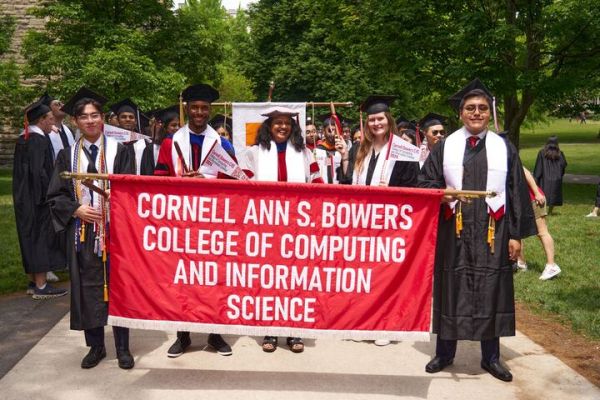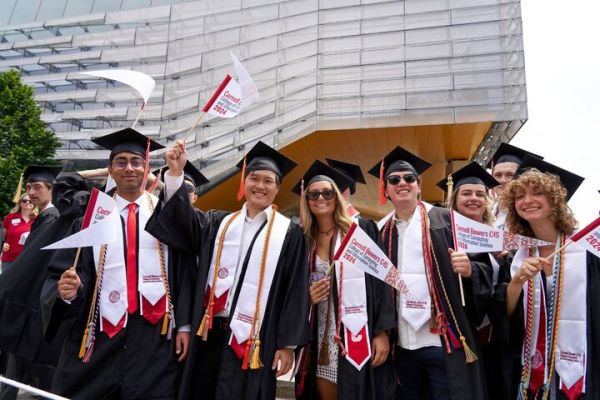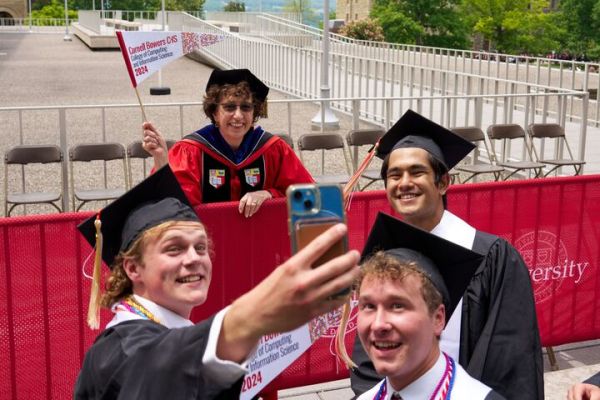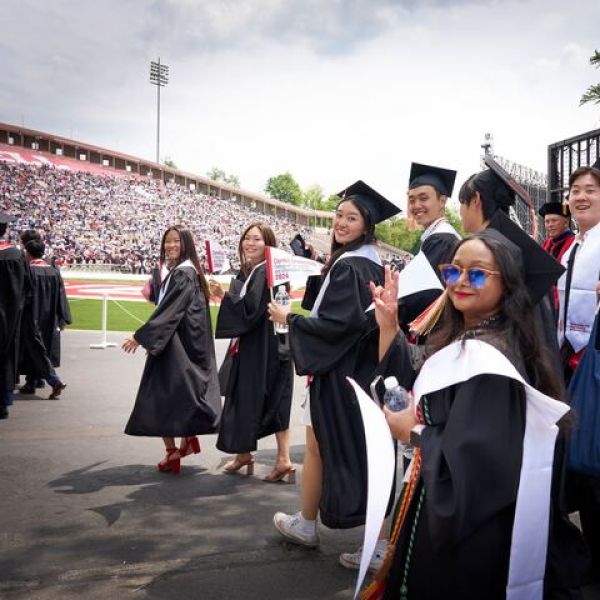May 28, 2024
By Louis DiPietro and Patricia Waldron
More than 1,200 graduates from the Cornell Ann S. Bowers College of Computing and Information Science – the largest graduating class in the college’s history – were recognized in separate department recognition ceremonies held Friday, May 24 and Saturday, May 25 in Barton Hall.
“You are architects of the future,” said Kavita Bala, dean of Cornell Bowers CIS, to the new graduates. “You should couple this feeling of limitless opportunity with a sense of responsibility, not just to innovate but to actively shape a future where technology serves as a force for enduring good.”
The record-setting class of 2024, which formally received their degrees at the university’s afternoon ceremony on Saturday, represents undergraduate, master’s, and Ph.D. students who graduated or plan to graduate in December 2023, May 2024 and August 2024 from one of the college’s three departments: computer science, information science, and statistics and data science.
For the class of 2024 undergraduates and their friends and family, weekend graduation activities were notably special: many did not get the opportunity to celebrate in-person high school graduations in 2020 due to the pandemic.

Bala commended graduates for weathering unprecedented instability and uncertainty, from a global pandemic and the realities of global conflict to the urgent call of the climate crisis. Through the skills and knowledge acquired at Cornell, graduates have what it takes to persevere and make a difference, she said.
“You are fortunate to be in a field where your impact is immediate,” she said. “While it may feel as though you are plugging away at a minor problem each day, solving that puzzle may lead to a major breakthrough. Keep that big picture in mind.”
“As the world evolves, so must you, continually adapting and always learning,” she said. “Remember that what you studied here is only the beginning.”
Statistics and Data Science
In his remarks at the Department of Statistics and Data Science ceremony, Martin Wells, department chair and the Charles A. Alexander Professor of Statistical Sciences, said the class of 2024 has developed valuable skills that go beyond academic knowledge, notably in navigating the challenges of COVID-19.
“These skills include adaptability, resilience, time management, problem solving, communication skills, technology proficiency, self discipline, empathy, compassion, and flexibility,” he said. “They were essential for navigating the difficulties of college during the pandemic and will continue to be essential for success in various aspects of life after graduation.”
In celebrating the graduates’ achievement, Wells emphasized that graduates did not tread this path alone. He honored the families, friends, and fellow students who offered graduates unwavering support in their academic journeys.
“As you step into the next chapter of your lives,” Wells told the roughly 140 graduates, “remember to embrace new challenges, continue learning, and pursue your passions.”

Information Science
“Technology is vital, but it’s not enough by itself,” said David Mimno, chair of information science and associate professor, in emphasizing the importance of information scientists in developing cutting edge technology like ChatGPT, a large language model powered by artificial intelligence (AI).
In information science, “we want young people to be well-versed in the latest technology, but we don’t stop there,” he said. “We want our graduates to tackle big problems – the biggest problems – the problems that can’t be solved by one skill or even one discipline.”
Amazing things will be expected of the department’s roughly 400 graduates, Mimno said, not only because graduates have the ability, but because they will have no choice. With AI’s emergence, mediocrity is free, and “pretty good” is now the baseline, he said.
“To stand out, you need to have something special, some spark that distinguishes you from an ocean of generic, mealy, language model pabulum,” he said. “We hope that your time at Cornell will give you that spark, that uniqueness.”
Jon Kleinberg ‘93, the Tisch University Professor of Computer Science and Information Science, was voted by graduates to give the ceremony’s keynote address. He commended graduates, many of whom started their college journeys amid the pandemic, for “showing a level of fortitude, bravery, and mutual support for each other that none of us on this stage had to muster when we were students in college.”
“We’ve all learned a lot from watching the way you rose to this challenge,” he said.
It may be tempting to think of graduation as the prize at the finish line, Kleinberg said, but it isn’t. The reward is in new beginnings, he said.
“It’s about commencing something new, beginning it with what you’ve learned here,” he said. “The time has arrived to begin.”
Computer Science
In the final recognition ceremony, held Saturday evening, the Department of Computer Science celebrated about 780 new graduates who will face exciting and important challenges in the field.

"You are poised to shape a future impossible to predict," Bala said. "While we cannot envision how technology will evolve and change society, we know the changes will be profound and far-reaching.”
She presented her vision of graduates going on to do great things: protecting the privacy of people’s data, designing assistive technologies, modeling climate change, enabling space travel, and more. “Embrace the spirit of risk taking and seek out the paths less traveled,” she said.
Éva Tardos, the Jacob Gould Schurman Professor of Computer Science and department chair, congratulated all the assembled graduates. She noted that earning a Cornell computer science degree is challenging even in the best of circumstances and acknowledged the difficulties posed by the COVID-19 pandemic that these graduates overcame.
"You are also graduating in what are truly exciting times for the tech industry. We are in the middle of the AI revolution. AI and computing in general is increasingly central in all aspects of our lives," Tardos said. "I hope you will all be thoughtful in your work and help make the world a better and more fair place."
This was the college’s largest ever graduating class of computer science undergraduate majors, Tardos said, numbering about 530 individuals. The class was also remarkably diverse: 36% are women, and 15% belong to underrepresented minority groups.
"Many of you in your work will make a huge difference in making the world a better place! I know there are more than 700 of you here who will do this in 700 different ways, and I would love to hear about it!" Tardos said. "Please keep in touch!"
Louis DiPietro and Patricia Waldron are writers for the Cornell Ann S. Bowers College of Computing and Information Science.



